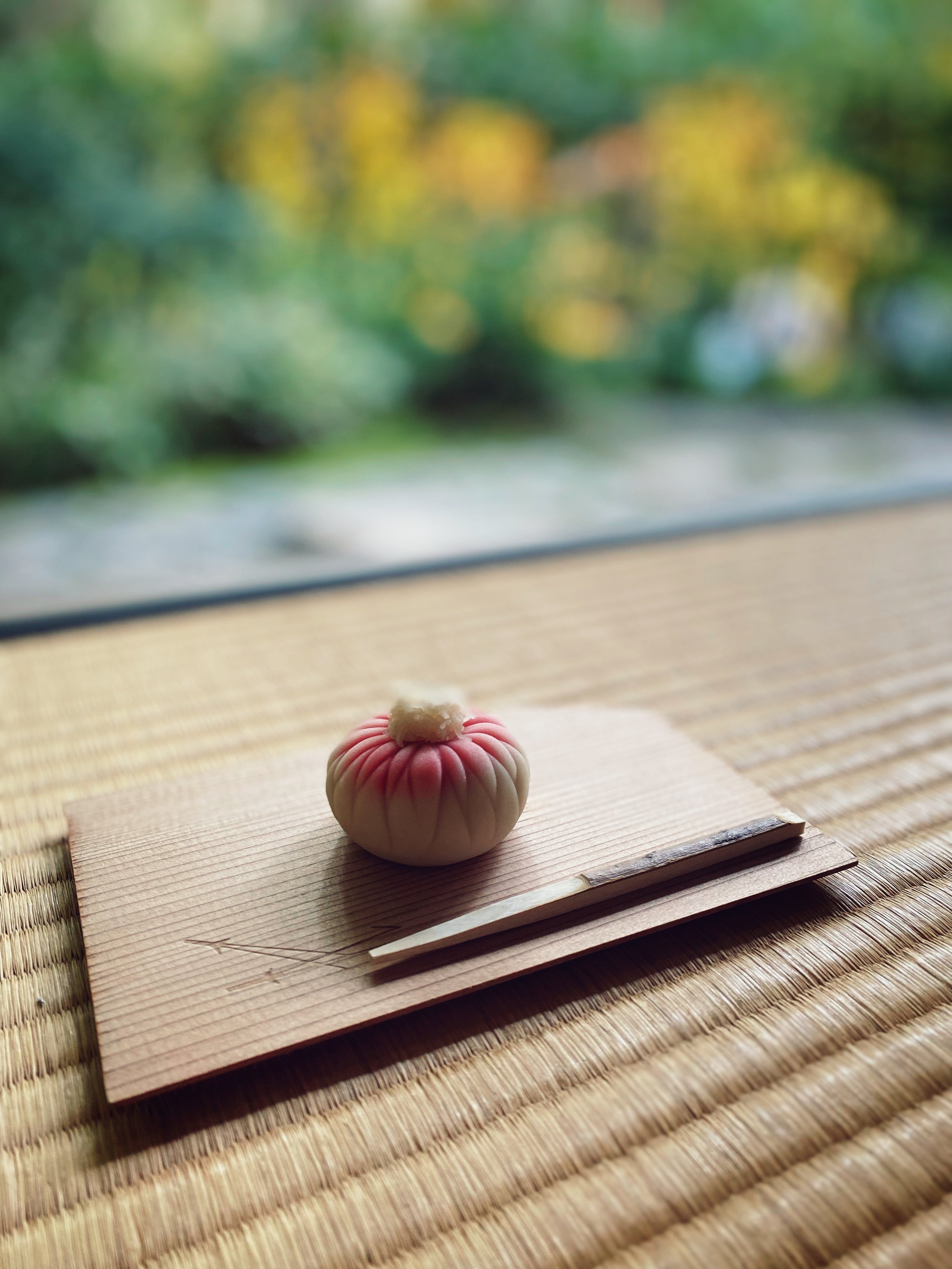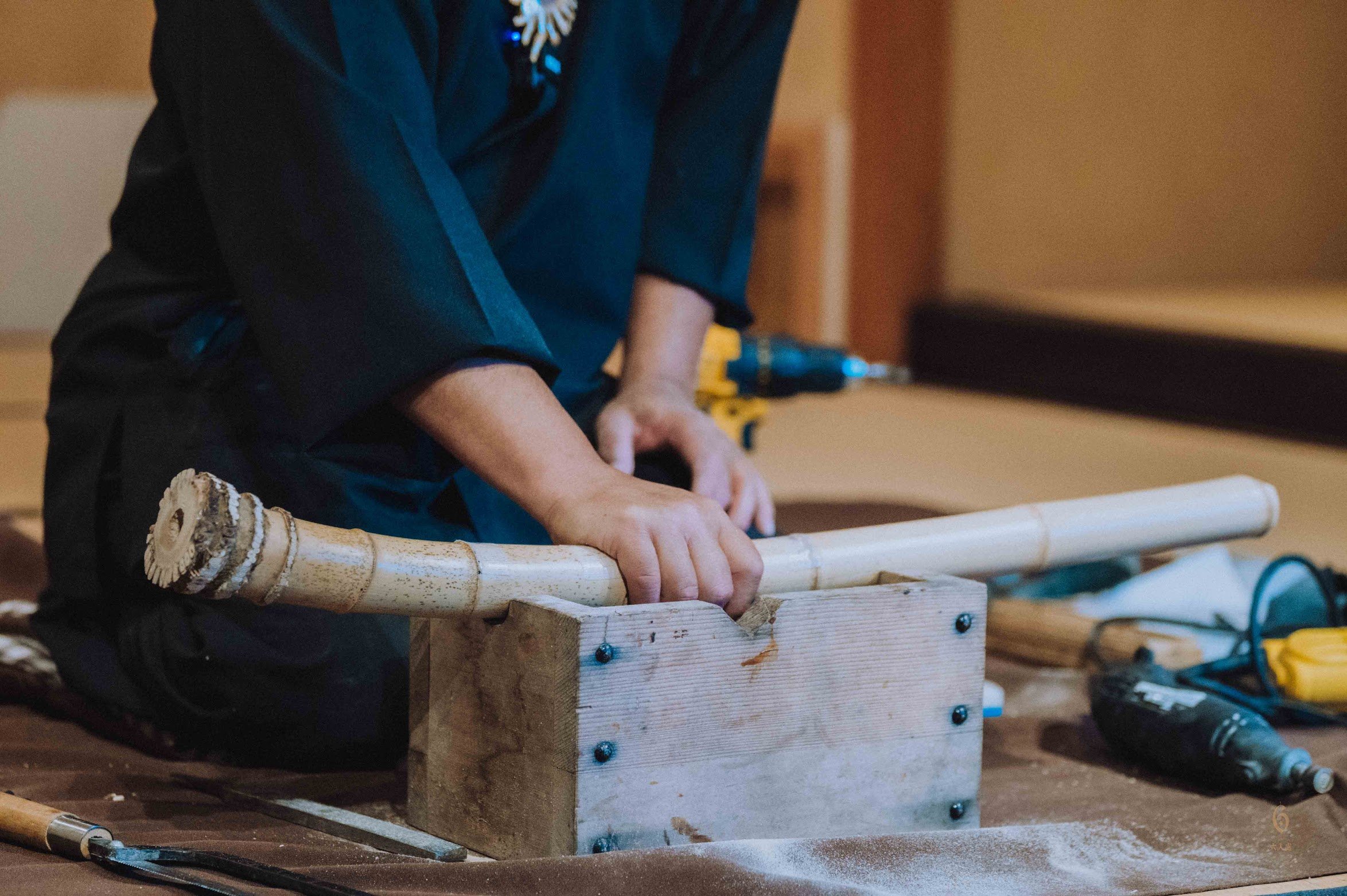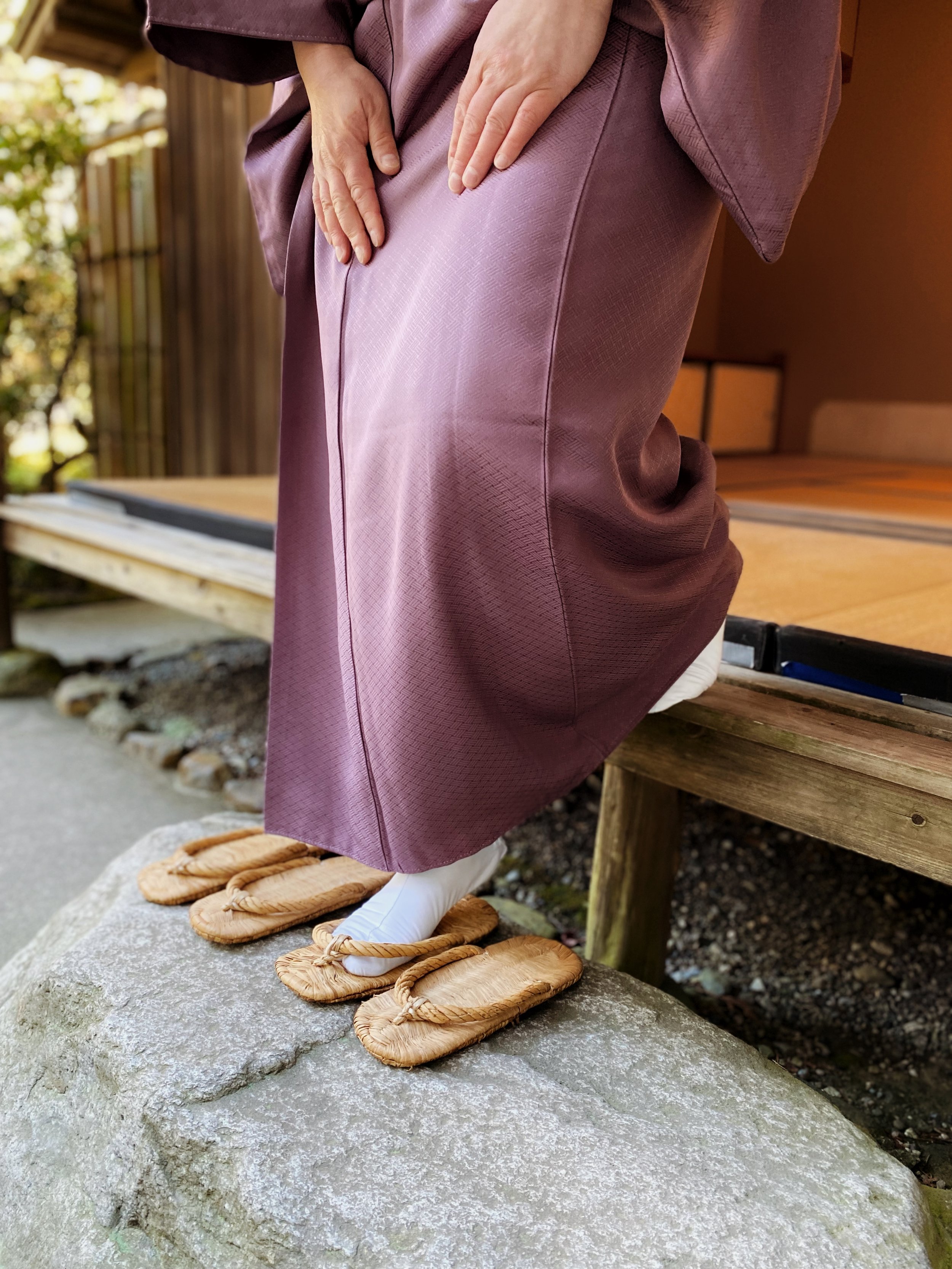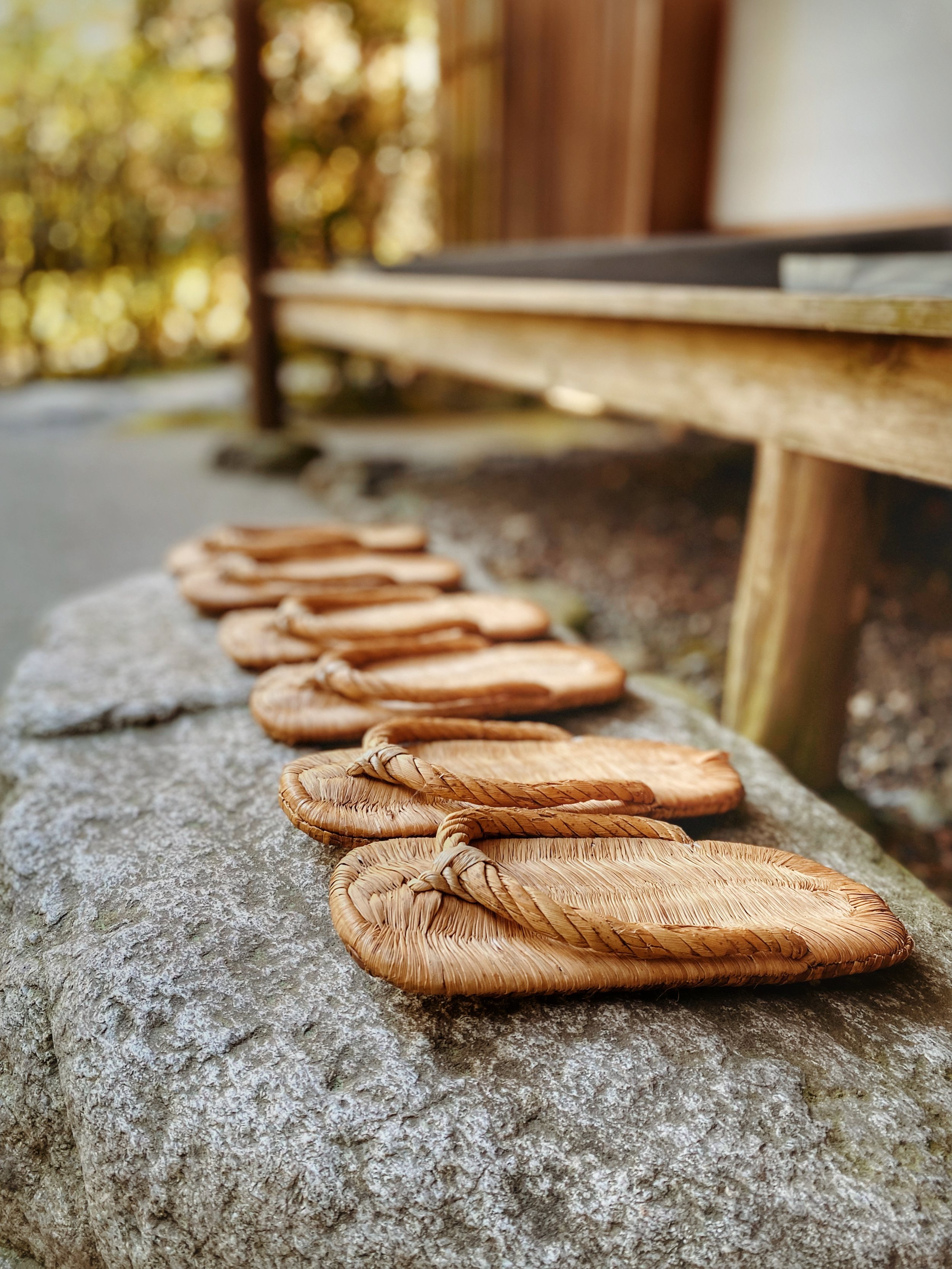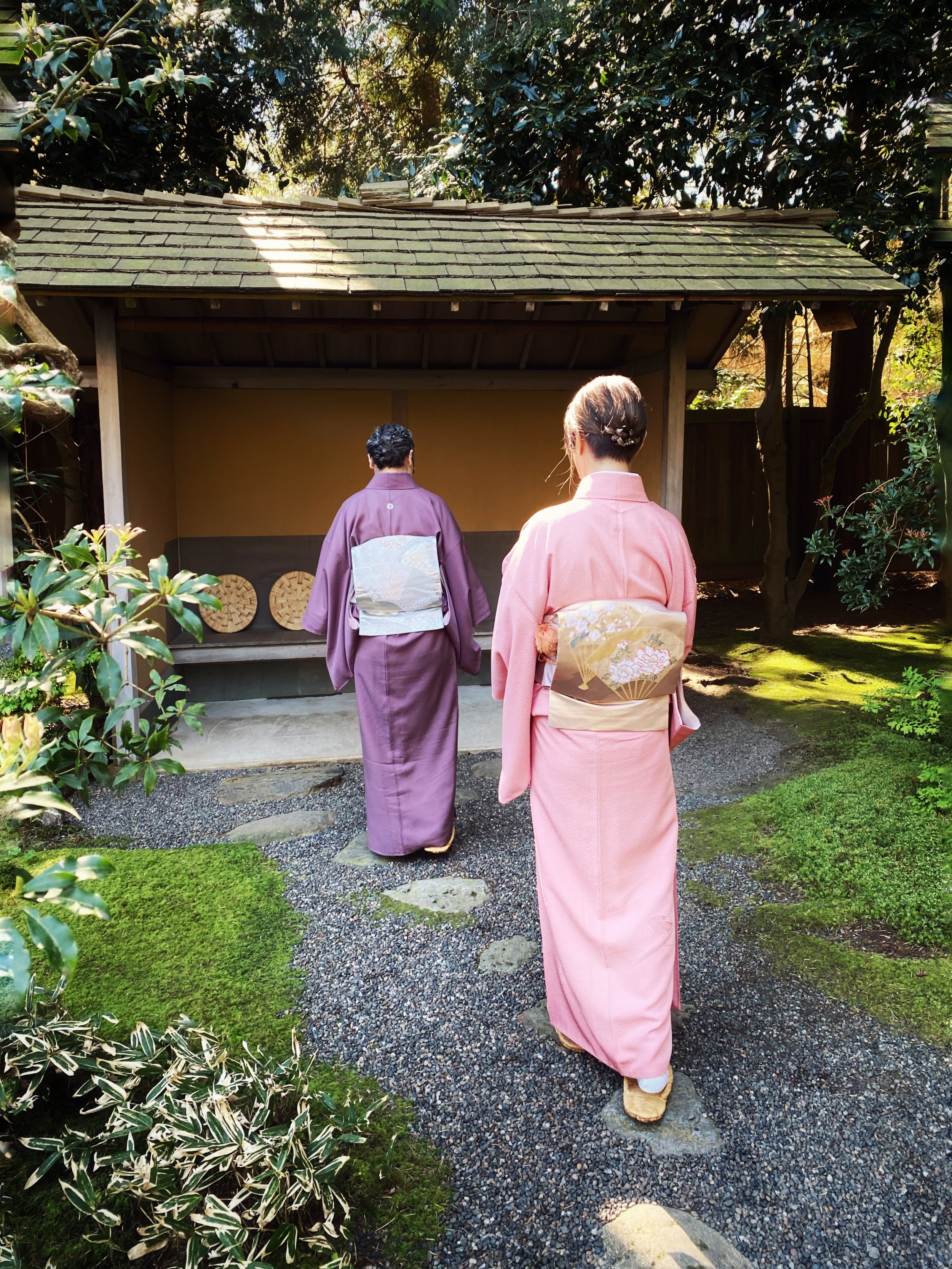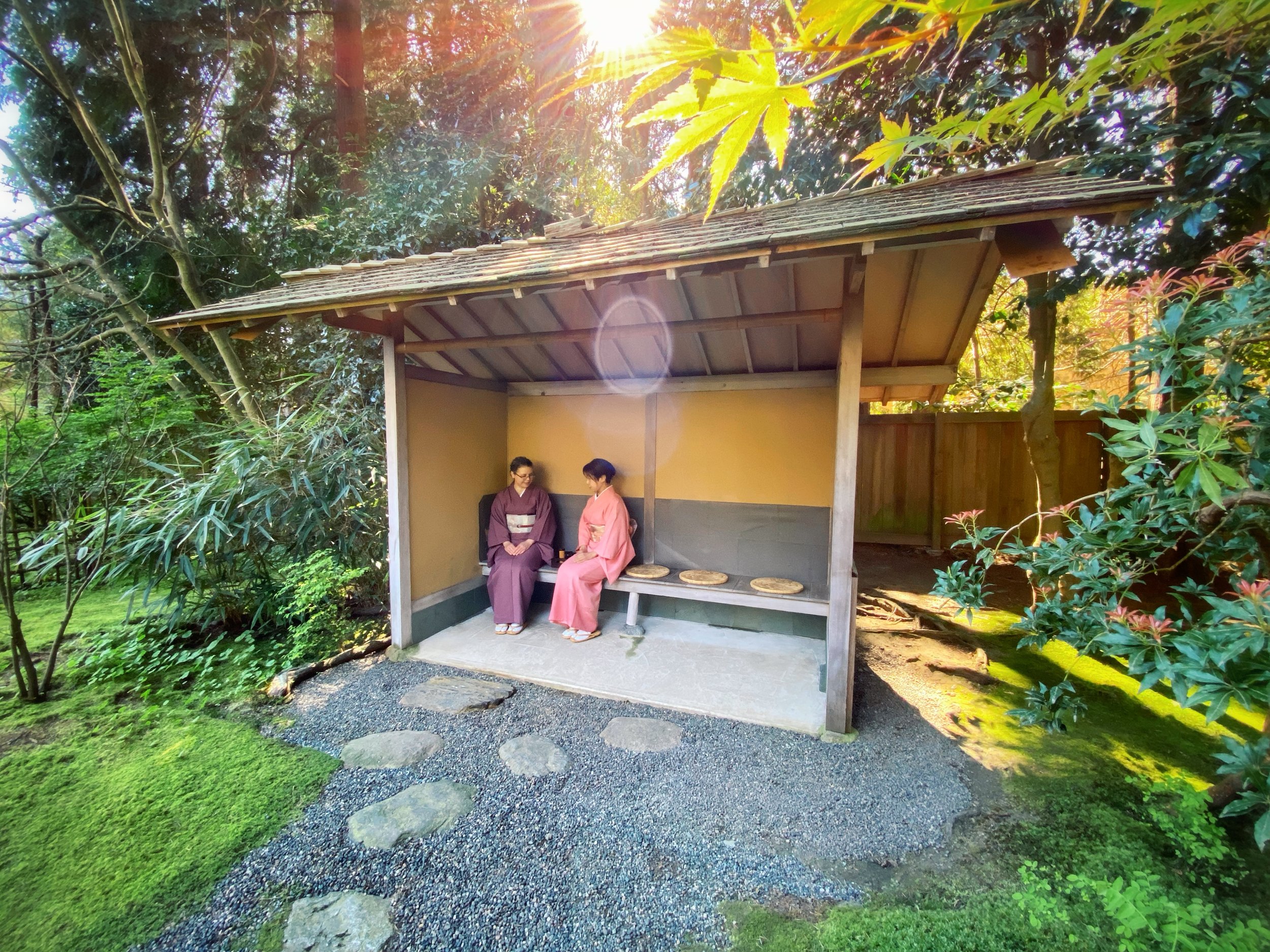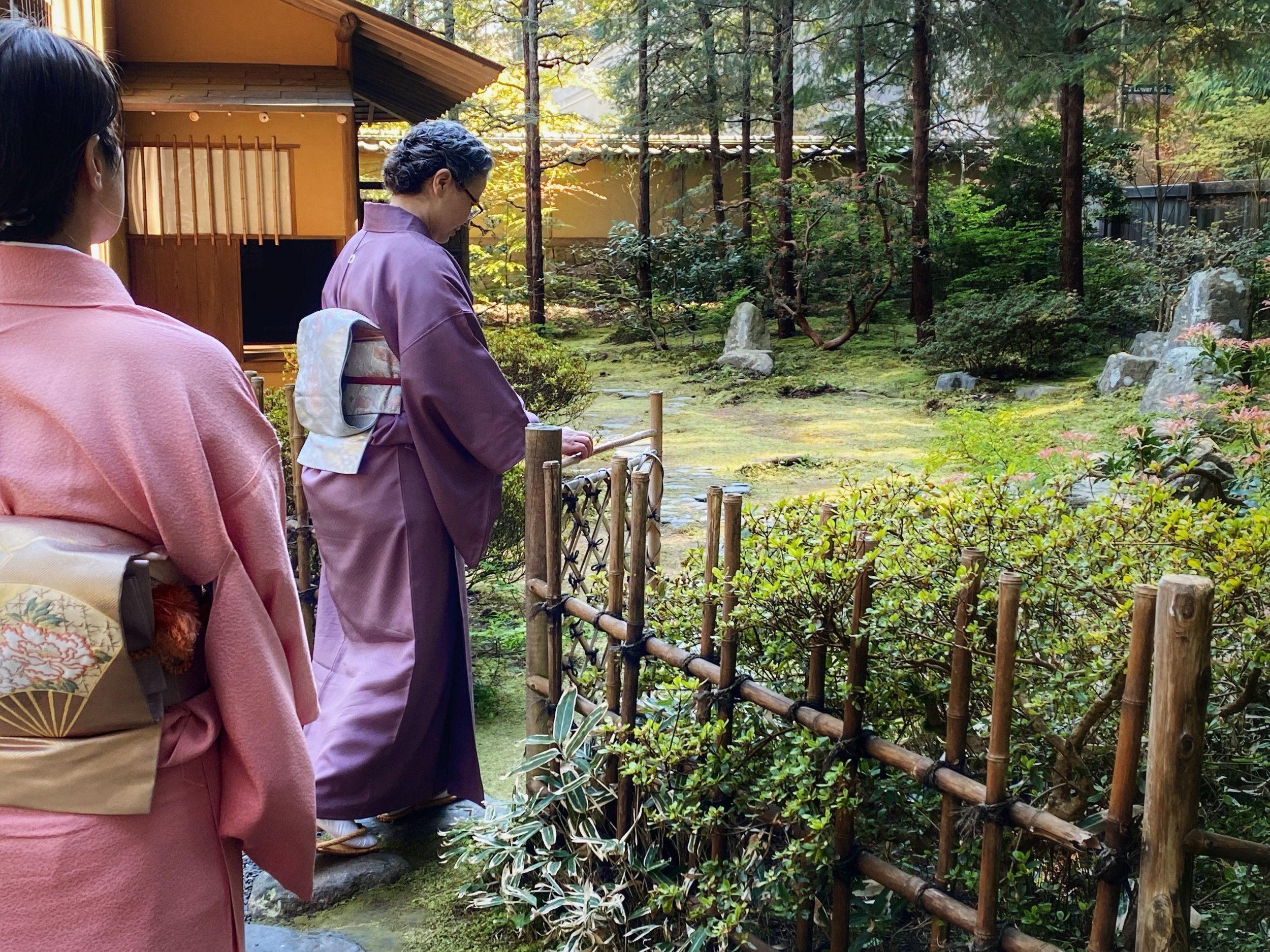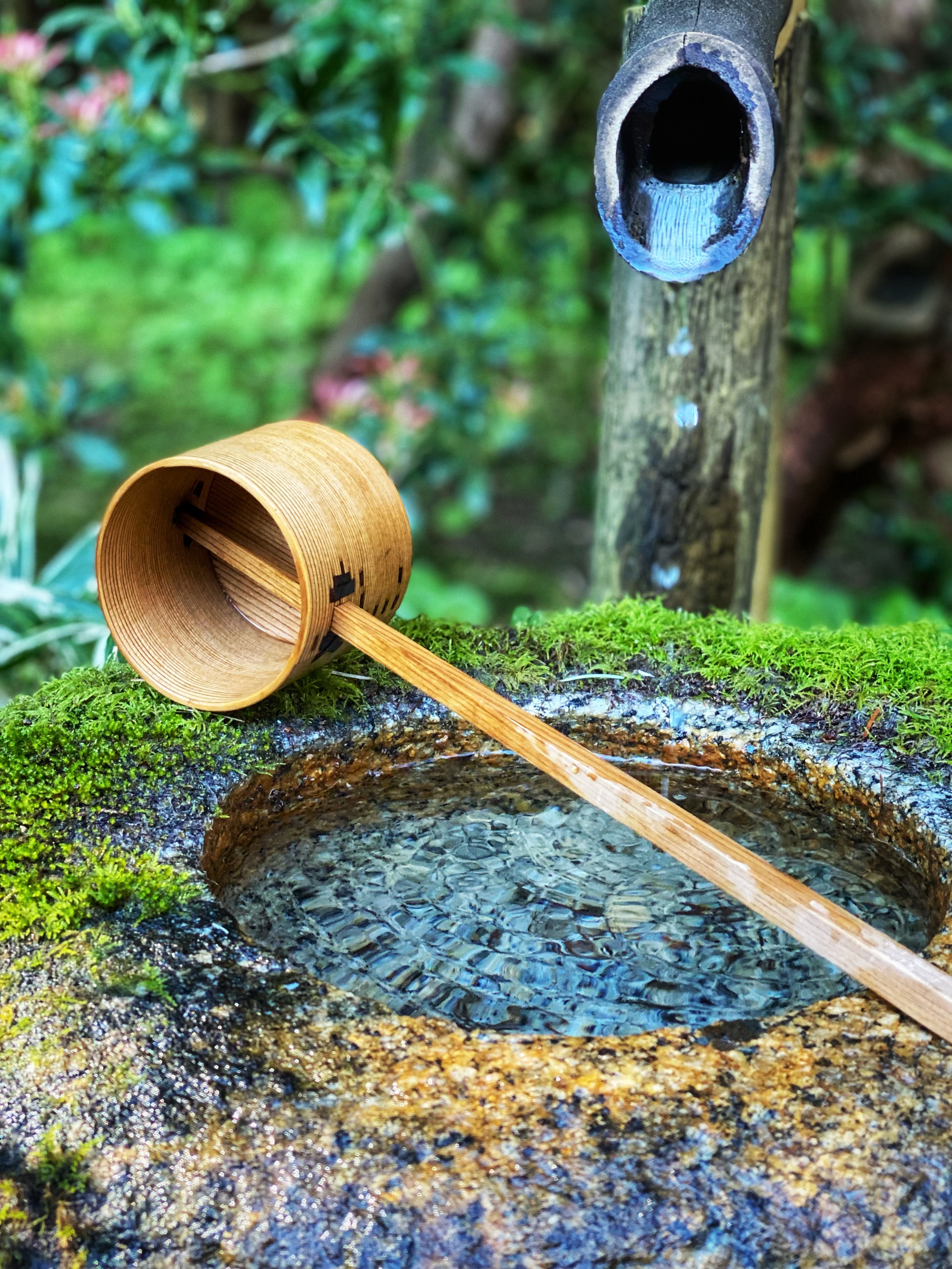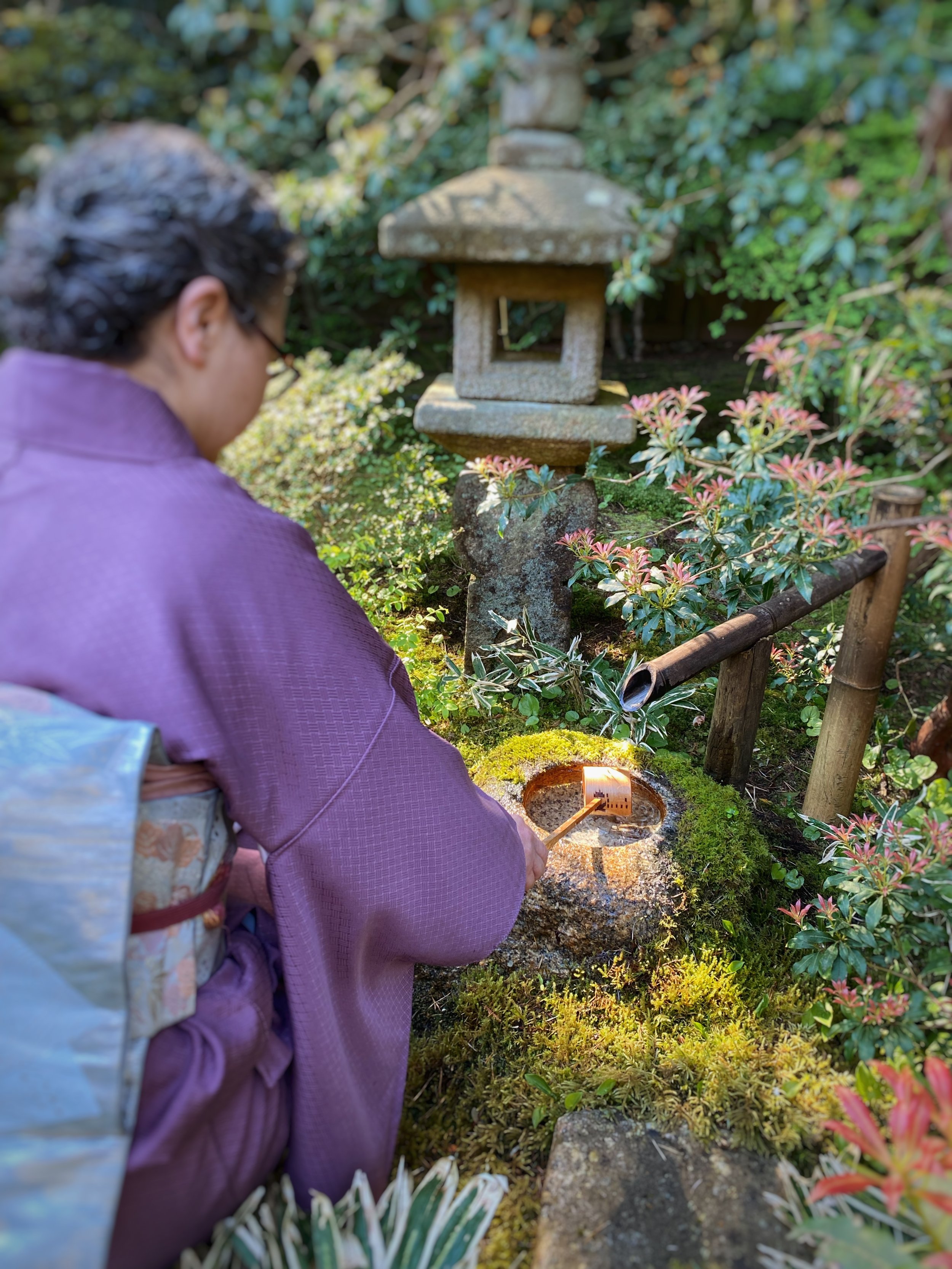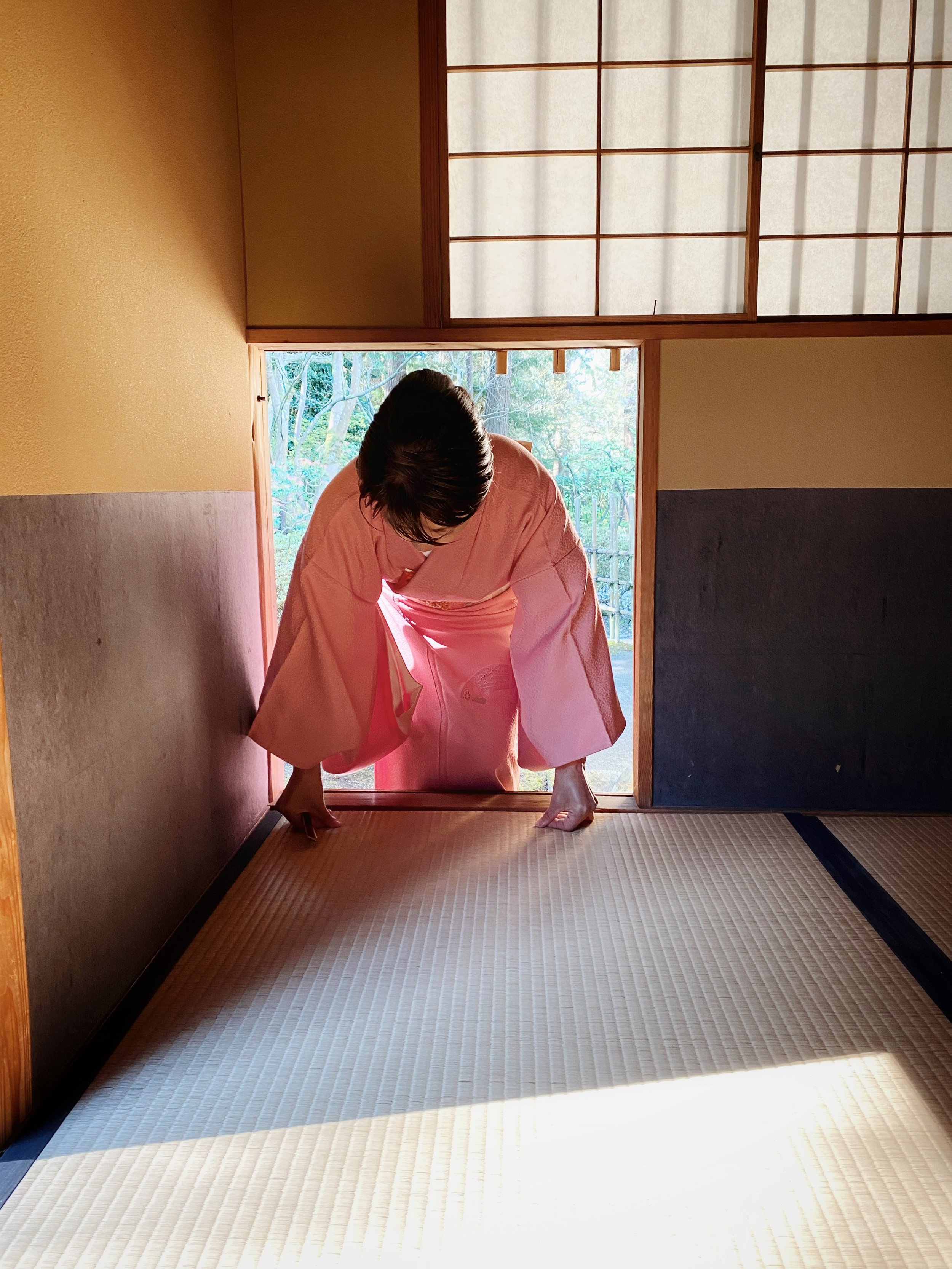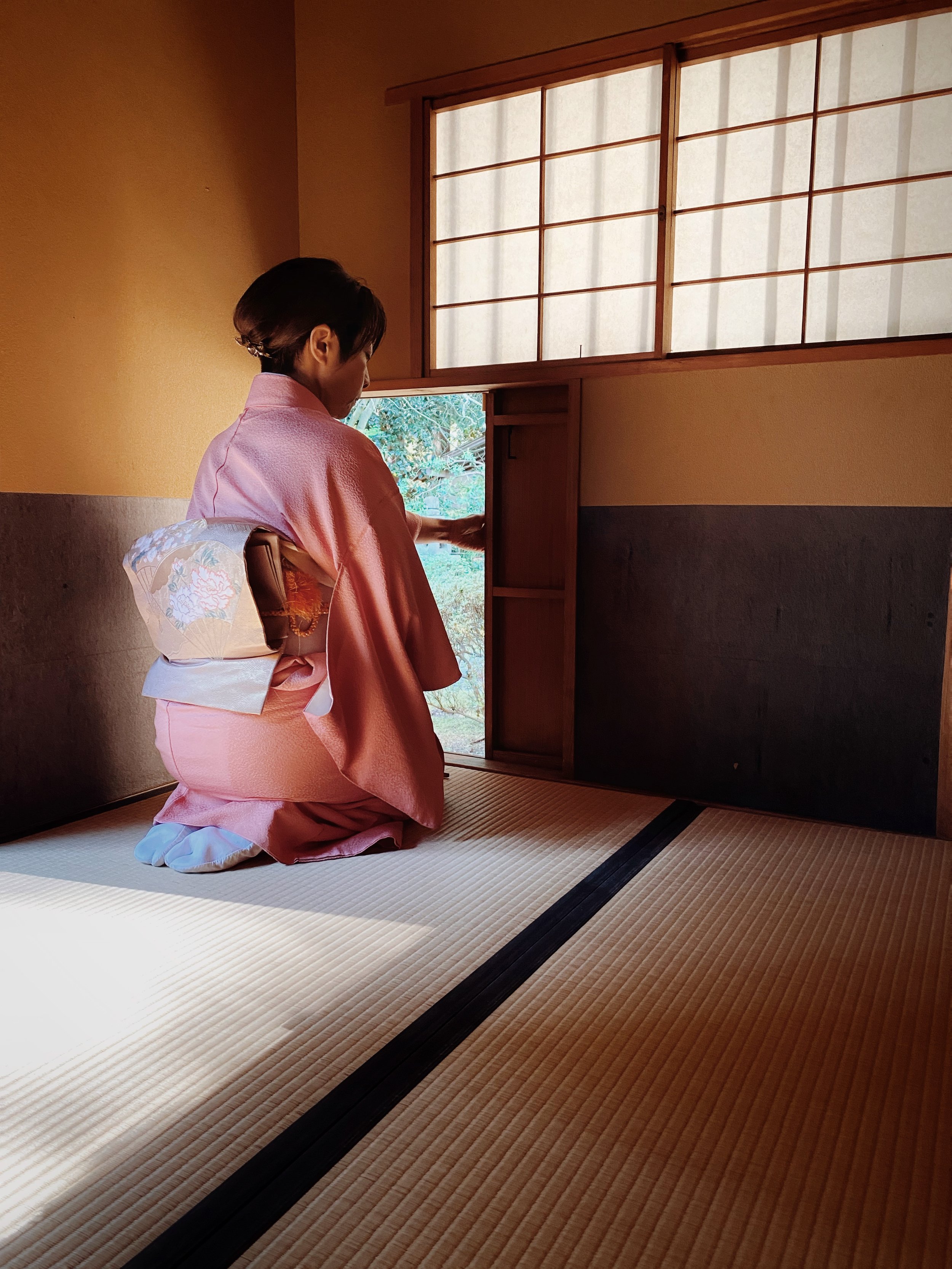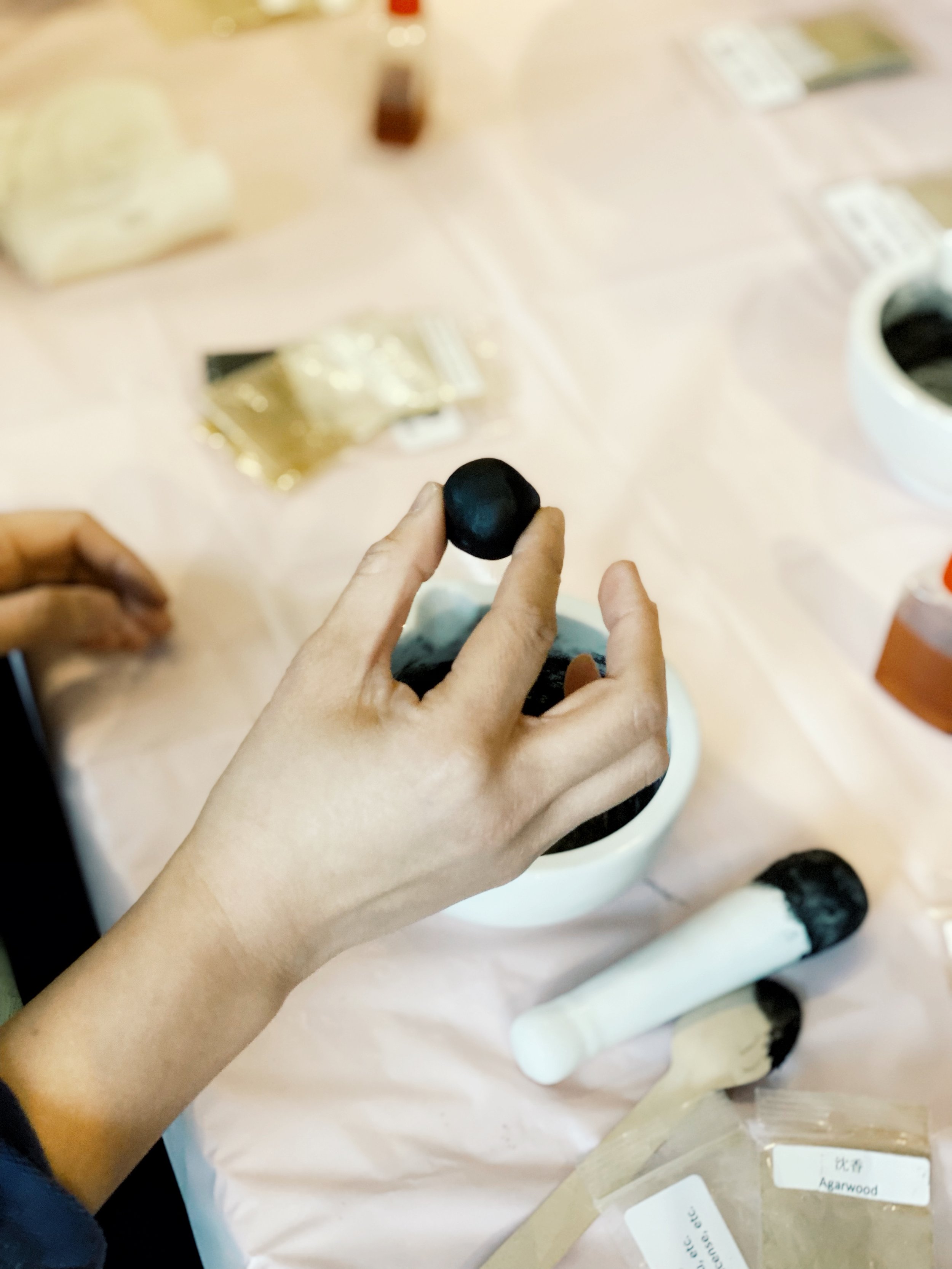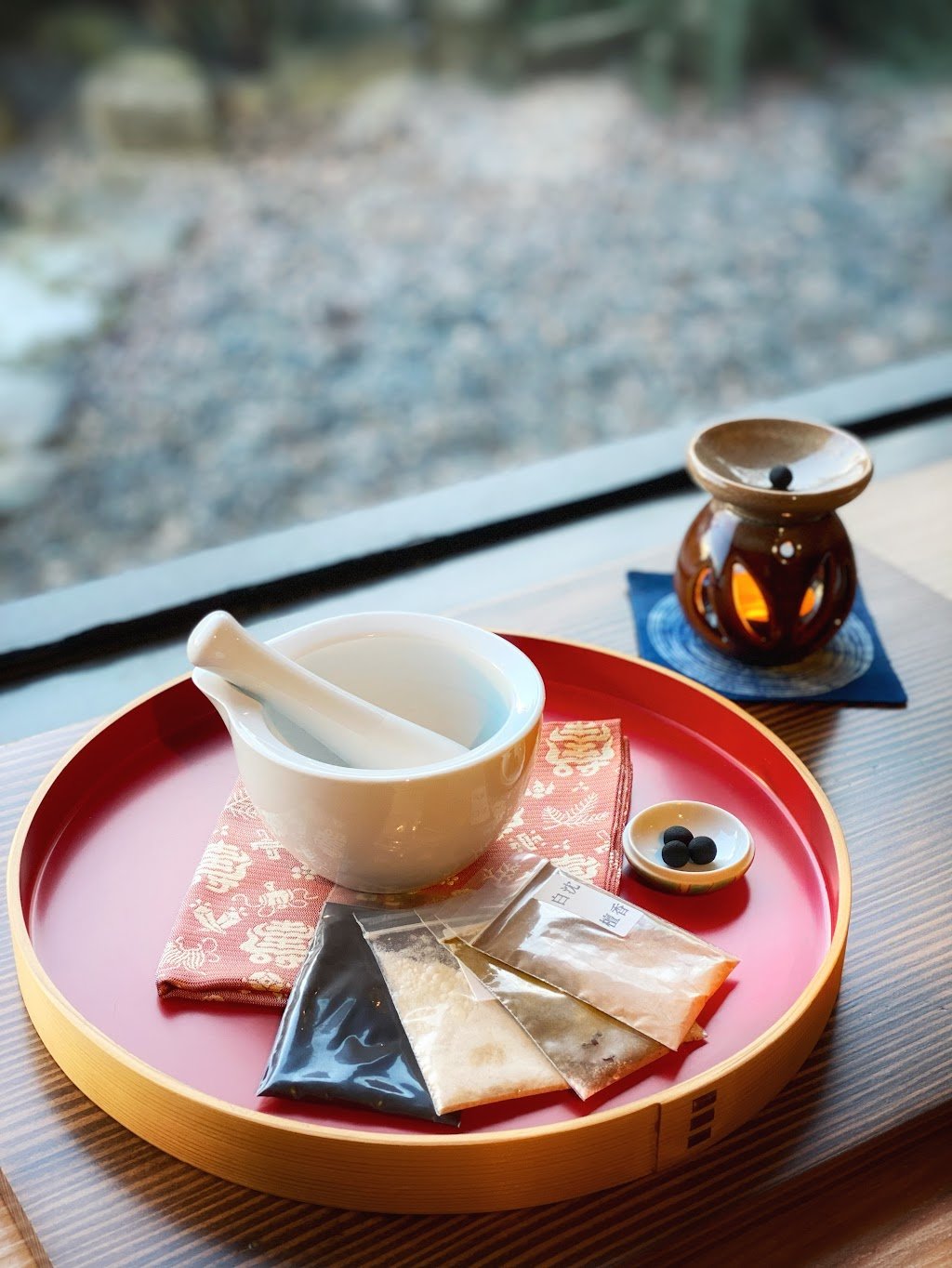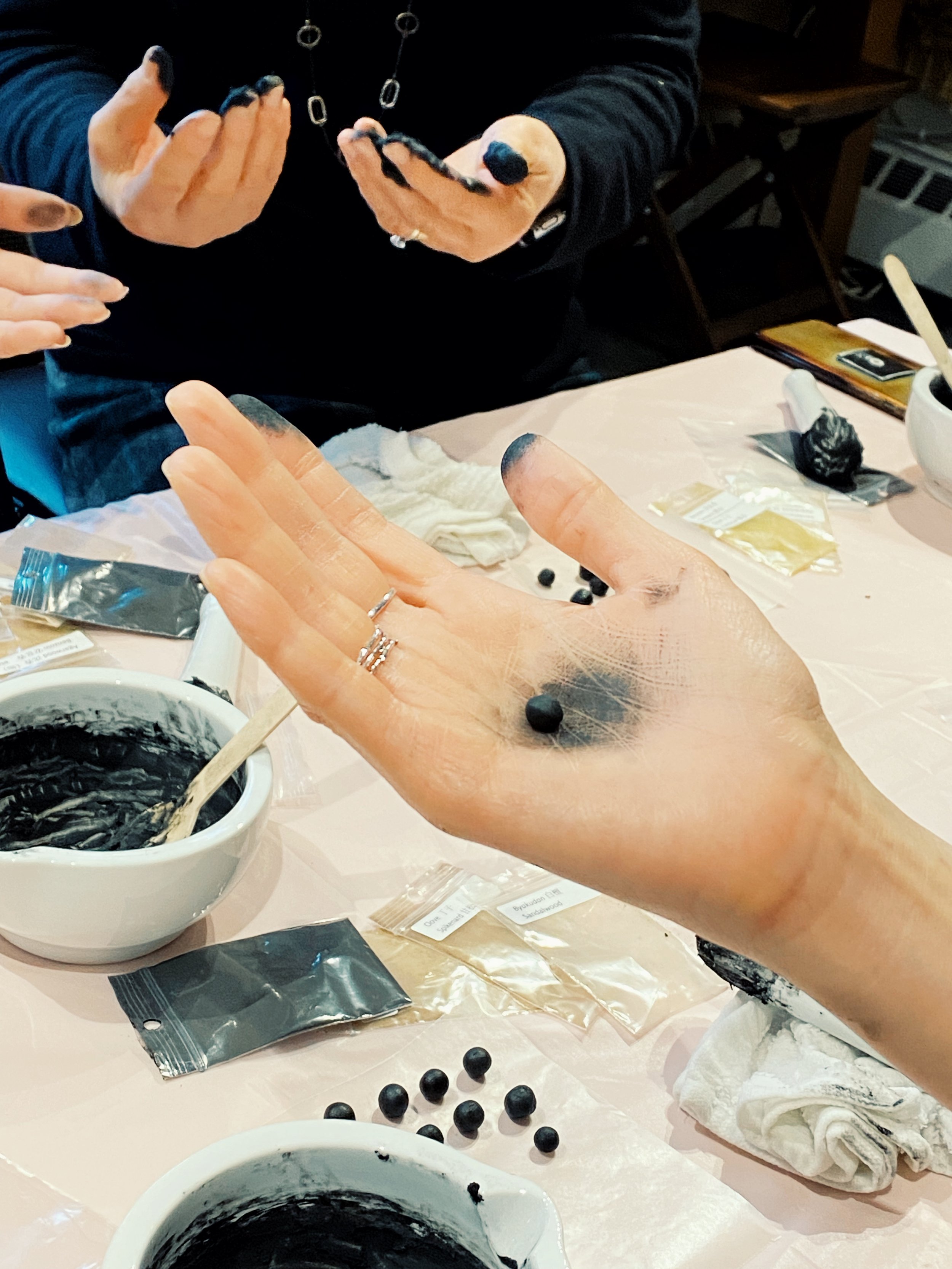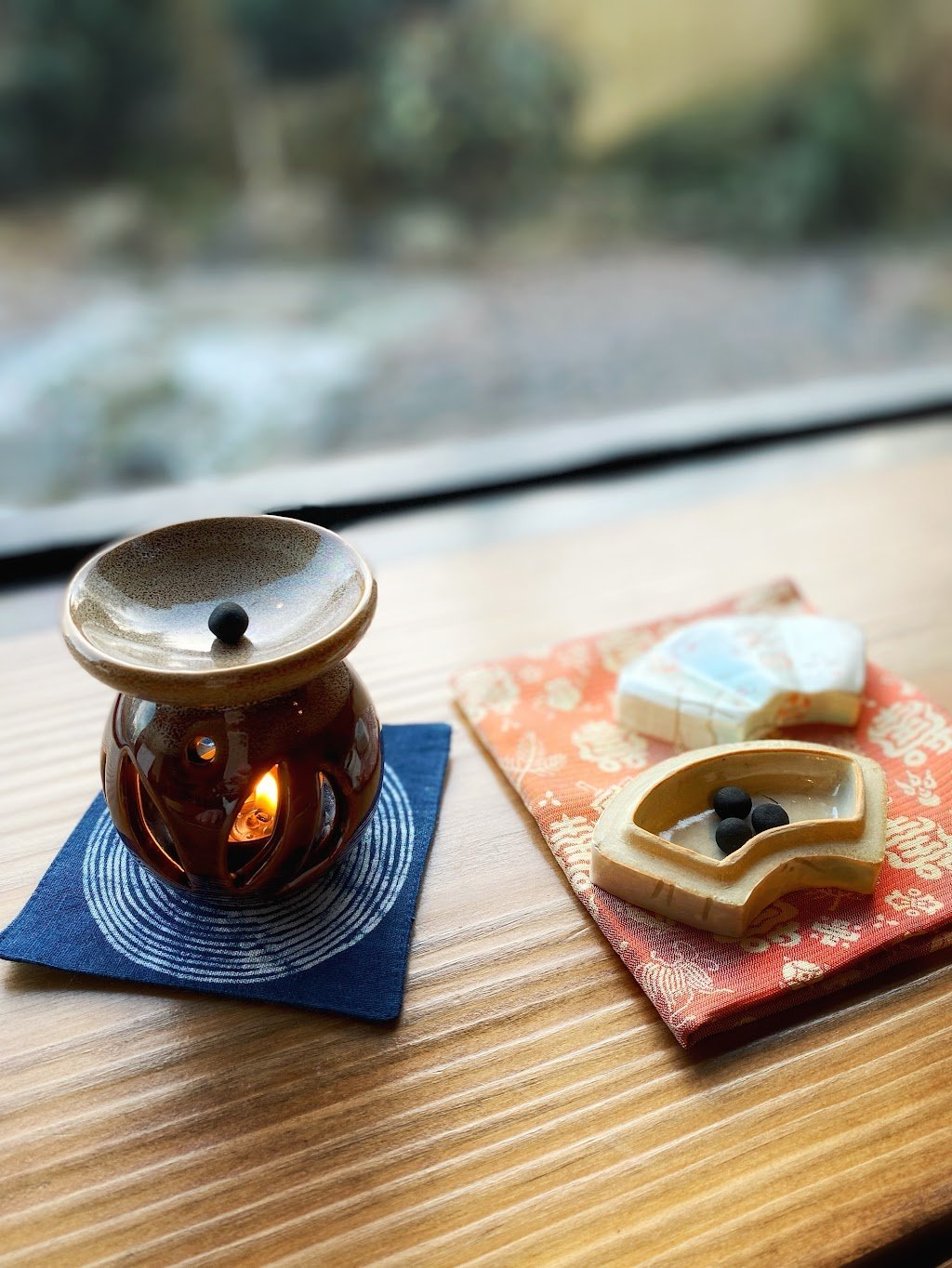
UPCOMING PROGRAMS
Welcome to The Dōjin Japanese Arts Society.
Dōjin Arts hosts intimate salon-style programs and provides opportunities for learning about various Japanese traditional arts, including tea ceremony, incense ceremony, ikebana flower arrangement, wagashi sweets, Japanese dance, music, kimono, ceramics, poetry, painting, calligraphy, and more.
To stay informed about upcoming programs and events, please join our mailing list.

Kumikō Incense Appreciation at Roedde House Museum
Kumikō Incense Appreciation at Roedde House Museum
Saturday April 26th
1:00 pm - 3:00 pm
Maximum 10 guests per session
Tickets: $40 / $35 (seniors & students)
Step back in time with us as we host an intimate Japanese incense gathering in the historic Roedde House dining room.
Join us for an intimate gathering at beautiful Roedde House where guests will be led to participate in a kumikō – a form of incense appreciation exercise developed around the Muromachi period (1338–1573). Experience and compare several types of highly fragrant woods in a game that incorporates seasonal and literary references. This session will be held in the ryūrei 立礼 style — seated at a long table rather than on tatami mats. This accessible format is a perfect introduction for those brand new to kōdō as well as a different style of experience for seasoned kumikō guests.
Register and purchase tickets through Roedde House:
About Roedde House Museum:
Roedde House is a late-Victorian home built in 1893 for bookbinder Gustav Roedde and his family. Located at 1415 Barclay Street in Vancouver, Roedde House was designed by architect Francis Rattenbury in the Queen Anne Revival style. The interiors have been carefully restored by the Roedde House Preservation Society with period furnishings and family artifacts.
About the Educator:
Dōjin Arts Founder and Executive Director Maiko Behr has worked as a Japanese to English translator, curator, and consultant specializing in Japanese arts for over twenty years. She is the owner of SaBi Tea Arts, where she teaches chanoyu (Japanese tea ceremony) in the Omotesenke tradition and kōdō (Japanese incense ceremony) in the Senzan Goryū tradition. In the non-profit sector, Maiko has served locally on the board of directors of the Tomoe Arts Society for over ten years, and has worked and volunteered for various Japanese and Asian arts-related non-profit associations and museums in Canada and the US.
We gratefully acknowledge the support of The Province of British Columbia.

EXPERIENCE KŌDŌ 2025: The Way of Japanese Incense
Coming Soon…
EXPERIENCE KŌDŌ 2025:
The Way of Japanese Incense
Symposium & Public Incense Ceremonies
Friday May 23 - Sunday May 25
at the University of British Columbia, Vancouver
This coming May, we are honoured to welcome Master NISHIGIWA Jhōyo, Headmaster Designate of the Senzan Goryū School of Incense Tradition, Kyoto, Japan, for a weekend of public incense gatherings and lectures on Japanese incense tradition at the University of British Columbia.
The program will provide a rich experience of incense culture with an array of activities focused around a special keynote lecture and symposium on Friday, May 23, and public incense gatherings on Saturday and Sunday, May 24 and 25.
Stay tuned for further updates and information coming soon. In the meantime, you can view the tentative schedule of programming below:
FRIDAY MAY 23, 2025
SYMPOSIUM
Time: 1:00-5:00 pm
Location: Dodson Room, I. K. Barber Learning Centre, UBC
KEYNOTE LECTURE by
NISHIGIWA Jhōyo, Headmaster Designate, Senzan Goryū School of Kōdō, Kyoto
ADDITIONAL LECTURES by
YANO Tamaki, Professor Emeritus, Dōshisha University, Kyoto
YOTSUTSUJI Hideki, Curator Emeritus, The Tokugawa Art Museum, Nagoya
VIEWING OF SPECIAL COLLECTIONS
Symposium attendees will be treated to a special viewing of recent acquisitions of Edo-period poem cards, calligraphic works, and narrative illustrations from the UBC Library Rare Books and Special Collections.
Time: 12:00-1:00 pm
Location: Peña Room, I. K. Barber Learning Centre, UBC
SATURDAY MAY 24 & SUNDAY MAY 25, 2025
PUBLIC INCENSE CEREMONIES
(participants will attend one of the two days)
We are excited to offer guests the opportunity for an immersive experience of Japanese incense traditions set amongst the beautiful Nitobe Memorial Garden and UBC Asian Centre.
Program to include:
1 Incense session featuring a single special incense (meikōgiki 名香聞)
1 Incense session consisting of an exercise in discerning among several different woods in a seasonally-themed scent-matching game (kumikō 組香)
Guided tours of Nitobe Memorial Garden
Matcha tea service
Educational exhibits and demonstrations
More information coming soon. Keep an eye on this page and be sure to join our mailing list (in the footer below) for updates and advance access to registration.

Immersive Tea Ceremony Experience at Nitobe Memorial Garden Ichibōan Tea House
Photos: Christina Cecconi
Immersive Tea Ceremony Experience of the Ichibōan Tea House and Roji Path at Nitobe Memorial Garden
Dates: On the Second Sundays of the Month:
June 8th, July 13th, August 10th, and September 14th, 2025
Session One: 11:30 am / Session Two: 1:00 pm / Session Three: 2:30 pm
Max Capacity: 5 people per session
Length: 75 minutes each
Location: Nitobe Memorial Garden, UBC
Price: $55 - includes matcha tea service & admission to the garden
Join Maiko Behr, Founder and Executive Director of Dōjin Arts and tea instructor in the Omotesenke tradition, on a guided experience through the teahouse garden (roji) as guests would traditionally use the space -- slipping into "garden sandals" to navigate the stepping stones, sitting in the "waiting arbor," rinsing hands at the tsukubai stone basin, and entering the tea room through the nijiriguchi “crawling entrance.” As Maiko shares insights into the design and cultural significance of the tea garden and the tea house structure itself, feel yourself leaving the outside world behind as you proceed along the path and prepare to enter the tea room. Once inside, enjoy a matcha tea service with a special seasonal wagashi sweet.
Each 75-minute session will accommodate a maximum of 5 participants to ensure an intimate, interactive learning experience.
*Please Note: The sweet may contain sugar, rice, beans, wheat, eggs, or other potential allergens. We can advise you of all ingredients in advance, but regret that substitutions may not be possible.
About the Educator:
Maiko Behr has worked as a Japanese to English translator, curator, and consultant specializing in Japanese arts for over twenty years. She is the owner of SaBi Tea Arts, where she teaches chanoyu (Japanese tea ceremony) in the Omotesenke tradition and kōdō (Japanese incense ceremony) in the Senzan Goryū tradition. In the non-profit sector, Maiko has served locally on the board of directors of the Tomoe Arts Society for over ten years, and has worked and volunteered for various Japanese and Asian arts-related non-profit associations and museums in Canada and the US.
For advance access to registration, be sure to subscribe to our newsletter.
Presented in partnership with UBC Botanical Garden and Nitobe Memorial Garden.
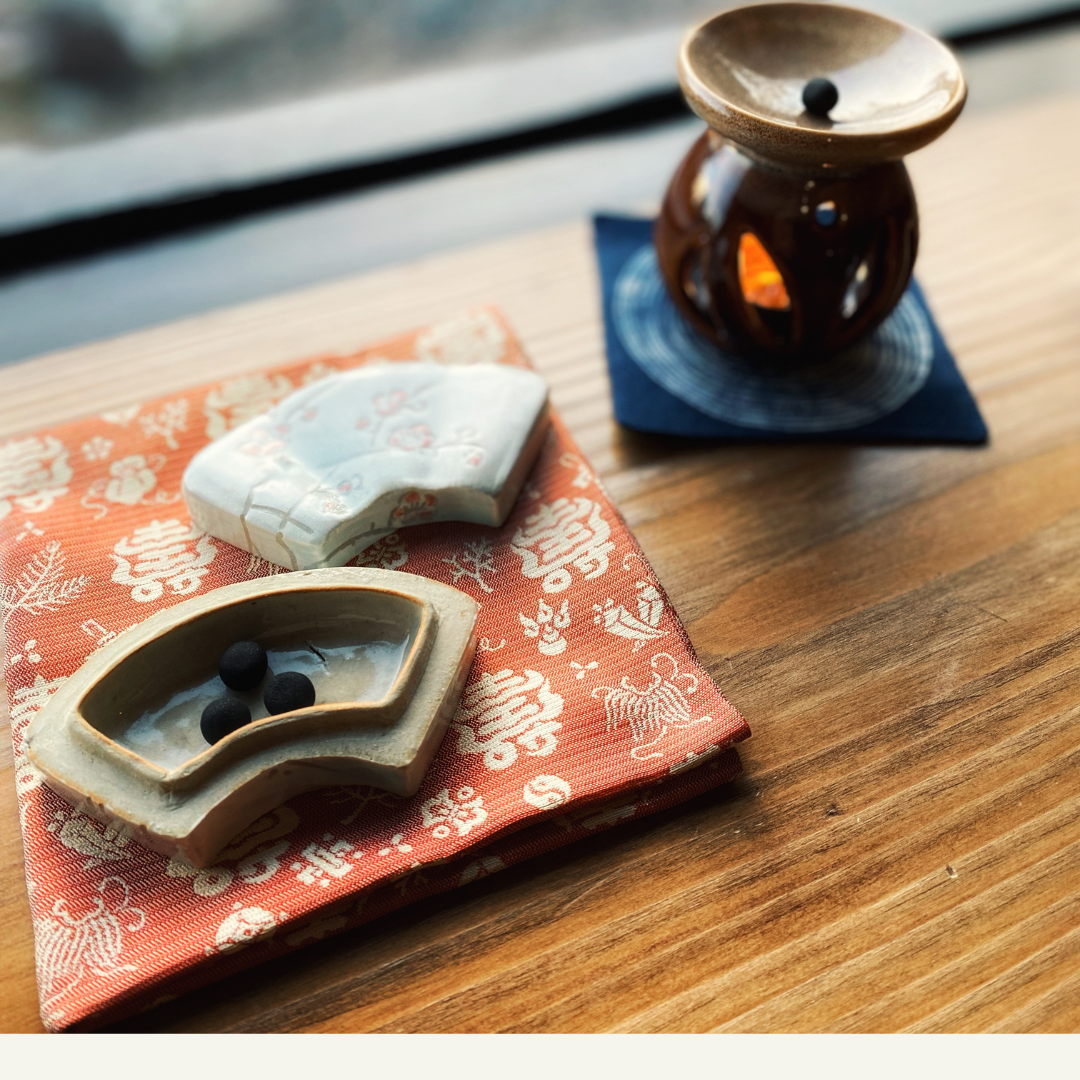
Nerikō: Japanese Kneaded Incense - Hands-on workshop & Lecture at SaBi Tea Arts
Nerikō: Japanese Kneaded Incense
Hands-on Workshop & Lecture at SaBi Tea Arts
Date: Sunday January 26, 2025
Location: SaBi Tea Arts - 16th Avenue at Dunbar in Vancouver
**Please note that we are also offering this program at the Nikkei National Museum & Cultural Centre in Burnaby on Sunday January 19th. To register for the Nerikō workshop in Burnaby, click here (registration opening soon).
Session Fee: $45 (includes all materials and supplies)
Times: We will be offering two time options for this 90-minute workshop:
Session one 11:00 am - 12:30 pm
Session two 1:30 pm - 3:00 pm
*Become a newsletter subscriber and enjoy advanced access to register for our programs!
Learn about the art and history of Japanese blended incense before making your own batch of nerikō to enjoy at home.
Since the Heian period (794-1192), fragrant powdered ingredients were mixed with honey or plum flesh and kneaded into round pastilles know as nerikō. This form of incense is indirectly heated rather than burned to release aroma - ideal for individuals sensitive to smoke.
During this 90-minute, hands-on workshop, guests will learn about the significance of nerikō and its use throughout Japanese history before getting their hands dirty blending and rolling their own incense to take home.
All supplies and equipment will be provided, including specially formulated recipes crafted by the Senzan Goryū school of Kōdō (incense ceremony) in Kyoto, Japan.
About the Educators:
Maiko Myōkō Behr has worked as a Japanese to English translator, curator, and consultant specializing in Japanese arts for over twenty years. She is the owner of SaBi Tea Arts, where she teaches chanoyu (Japanese tea ceremony) in the Omotesenke tradition and kōdō (Japanese incense ceremony) in the Senzan Goryū tradition.
Hitomi Tōkō Ginnan is a certified kōdō instructor in the Senzan Goryū tradition. She teaches kōdō and holds monthly kumikō (incense gatherings) in both Japanese and English at SaBi Tea Arts in Vancouver.
About Our Venue Partner:
SABI Tea Arts is an eight-mat, traditional Japanese tea room space in Vancouver for experiencing and learning about chanoyu (Japanese tea tradition), kōdō (the Japanese Way of Incense), and related arts. Learn more on their website here.
We acknowledge the financial support of the Province of British Columbia.

Nerikō: Japanese Kneaded Incense - Hands-on workshop & Lecture at Nikkei National Museum & Cultural Centre
Nerikō: Japanese Kneaded Incense
Hands-on Workshop Lecture
at the Nikkei National Museum & Cultural Centre
Date: Sunday January 19, 2025
Location: The Nikkei National Museum & Cultural Centre (Matsu Room 201)
*Please note that we are also offering this program at SaBi Tea Arts in Vancouver on Sunday January 26th. To register for the Nerikō workshop in Vancouver, click here (registration opening soon).
Session Fee: $45 (includes all materials and supplies)
Times: We will be offering two time options for this 90-minute workshop:
Session one 11:00 am - 12:30 pm
Session two 1:30 pm - 3:00 pm
*Become a newsletter subscriber and enjoy advanced access to register for our programs!
Learn about the art and history of Japanese blended incense before making your own batch of nerikō to enjoy at home.
Since the Heian period (794-1192), fragrant powdered ingredients were mixed with honey or plum flesh and kneaded into round pastilles know as nerikō. This form of incense is indirectly heated rather than burned to release aroma - ideal for individuals sensitive to smoke.
During this 90-minute, hands-on workshop, guests will learn about the significance of nerikō and its use throughout Japanese history before getting their hands dirty blending and rolling their own incense to take home.
All supplies and equipment will be provided, including specially formulated recipes crafted by the Senzan Goryū school of Kōdō (incense ceremony) in Kyoto, Japan.
About the Educators:
Maiko Myōkō Behr has worked as a Japanese to English translator, curator, and consultant specializing in Japanese arts for over twenty years. She is the owner of SaBi Tea Arts, where she teaches chanoyu (Japanese tea ceremony) in the Omotesenke tradition and kōdō (Japanese incense ceremony) in the Senzan Goryū tradition.
Hitomi Tōkō Ginnan is a certified kōdō instructor in the Senzan Goryū tradition. She teaches kōdō and holds monthly kumikō (incense gatherings) in both Japanese and English at SaBi Tea Arts in Vancouver.
About Our Venue Partner:
The Nikkei National Museum and Cultural Centre is a nationally recognized museum and gathering place that bridges Japanese and Canadian arts, culture, and history. This multi-use space offers unique programming, exhibits, and events throughout the year as a community place open to all.
We acknowledge the financial support of the Province of British Columbia.

What is Senchadō 煎茶道 ? An Introduction to Japanese Loose-leaf Tea Ceremony with Janice Chan
Photo credit: Janice Chan
What is Senchadō 煎茶道 ? An Introduction to Japanese Loose-leaf Tea Ceremony
Date: Sunday November 10, 2024
Time: 1:00 pm - 2:30 pm
Location: SaBi Tea Arts on 16th at Dunbar
Session Fee: $35
Sign up for our newsletter to enjoy advanced access to programs ahead of the general release date.
When people think of Japanese tea ceremony, they often picture the preparation of matcha in the traditional practice known as sadō (茶道) or chanoyu (茶の湯). But there is another rich tradition in Japanese tea culture: Senchadō (煎茶道), the Way of Sencha.
Originating during the Edo period, Senchadō featured loose-leaf tea and was deeply influenced by Chinese tea practices from the Ming and Qing dynasties. Once a favourite among the literati, this art form saw a decline after the Meiji period and remains lesser-known today—even in Japan.
In this lecture-demonstration, Janice Chan, a dedicated student of the Senchadō Oubaku-Baisa Ryu school, will take you on a visual journey through tea culture during the Edo period, highlighting the influences that shaped Senchadō. Enjoy a cup of tea as she shares her experiences participating in Senchadō ceremonies at Manpuku-ji Temple as well as performs a brief demonstration.
About the Educator:
Janice (Jan) Chan is the Global Japanese Tea Association (GJTA) representative for Western Canada and co-founder of Teakan. As a GJTA-certified Japanese Tea Master, Jan offers workshops and lectures that blend tradition with modern insights, sharing the history, practices, and unique experiences of Japanese tea culture. Her passion for Japanese tea has led her to immerse herself in its rich culture, practicing Chanoyu with the Urasenke School and studying Senchadō under the Oubaku-Baisa Ryu.
About Oubaku-Baisa Ryu 煎茶道 黄檗売茶流
Senchadō Oubaku-Baisa Ryu (煎茶道 黄檗売茶流) was founded by Tsūsen’an Tatsudō (1908-1958) and the style was developed from the tea ceremony at Ōbakusan Manpukuji Temple in Uji, Kyoto. Led by third-generation Tsūsen’an Takanori since 2019, the school aims to cultivate “an aesthetic sense” that evolves with time, leading to a deeper understanding of ourselves and finding beauty and pleasures in our everyday lives. Oubaku-Baisa Ryu has been a member of the All Japan Senchadō Federation since its inception and has continued to work to popularize and develop Senchadō to this day.
We acknowledge the financial support of the Province of British Columbia.
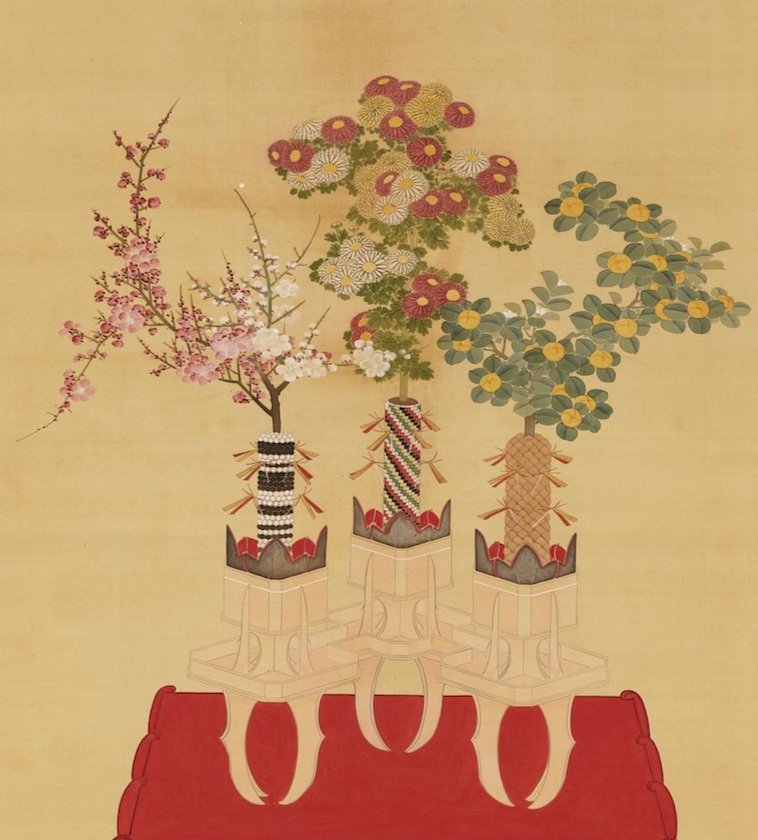
Deep Dives with Dōjin Arts Series: Origins of Ikebana
Image: Offering stand with Chikiribana flowers (detail), hanging scroll by Gotōda Nankei, 1855
Origins of Ikebana
Part of the “Deep Dives with Dōjin Arts” lecture/demonstration series
Date: Sunday November 3, 2024
Time: 1:00 PM - 2:30 PM
Location: The Nikkei National Museum & Cultural Centre
Session Fee: $25
Join Dōjin Arts on November 3rd as we celebrate Bunka no Hi 文化の日 Culture Day – a public holiday in Japan to celebrate traditional Japanese culture. This year we will be marking the occasion with a Deep Dive into the art of Ikebana – its history, its people, and its cultural treasures.
Image: Bun’ami kadensho (handscroll detail), Muromachi period, 14th-16th century, Rokuōin Temple, Kyoto
The program will begin with a slide lecture tracing the history of floral arrangements as they developed from early ritual offerings to formal displays at the court of shogun Ashikaga Yoshimasa in the late 15th century. Our Executive Director, Maiko Behr, will present a fascinating collection of images from ancient illustrated instruction manuals as well as photographs of treasured cultural properties demonstrating the deep connections between the evolving art of Ikebana (kadō) and its sister arts of tea (sadō) and incense (kōdō) as they took shape amidst the growing influence of Zen Buddhist philosophy and aesthetics.
Image: Cecily Chang, Senior Professor of Ikebana, Ikenobo School.
The slide lecture will be followed by a live ikebana demonstration showcasing three “standing flower” forms – early Tatehana, traditional-form Rikka, and new-form Rikka – by Cecily Chang of the Ikenobo school, the oldest school of ikebana and a lineage that was formalized during this seminal period in Japanese cultural history.
This program is perfect for anyone interested in ikebana and/or the major Zen-influenced arts that flourished during the Muromachi period.
We hope you will join us in this floral celebration of Bunka no Hi 文化の日 Culture Day!
About the Educators:
Maiko Behr has worked as a Japanese to English translator, curator, and consultant specializing in Japanese arts for over twenty years. She is the owner of SaBi Tea Arts, where she teaches chanoyu (Japanese tea ceremony) in the Omotesenke tradition and kōdō (Japanese incense ceremony) in the Senzan Goryū tradition. In the non-profit sector, Maiko has served locally on the board of directors of the Tomoe Arts Society for over ten years, and has worked and volunteered for various Japanese and Asian arts-related non-profit associations, museums, and private collections in Canada and the US.
Cecily Chang is a senior Professor of Ikebana, Ikenobo School. She has studied Ikebana for more than 40 years and has been teaching since 1995. She specializes in Japanese flower arrangement (Ikebana) and custom floral pieces for weddings and special events. Cecily was the Vice President of the Vancouver Ikebana Association in 2006/2007 & 2018/2019; and President for the 2008/2009, 2020/2021 seasons. She has been the President of Ikenobo Ikebana Society of Vancouver since 2020.
We acknowledge the financial support of the Province of British Columbia.

Tiny Hand-stitched Treasures : Learn to Make Kaga Yubinuki (Traditional Japanese Thimbles)
Image credit: Moira Fentum
Tiny Hand-stitched Treasures : Learn to Make Kaga Yubinuki (Traditional Japanese Thimble Rings)
Date: Sunday October 27, 2024
Time: 1:00 PM - 3:30 PM
Location: SaBi Tea Arts, on 16th Avenue at Dunbar in Vancouver
Workshop Fee: $45 (includes all supplies for making two unique yubinuki)
Sign up for our newsletter to enjoy advanced access to programs ahead of the general release date.
Explore the colourful world of Kaga Yubinuki (traditional thimbles from the Kaga region of Japan) as you learn to make your own tiny hand-stitched treasures ahead of the holiday gifting season!
In this hands-on workshop, participants will learn the basics of how to create their first yubinuki. All supplies will be provided as you are guided through the entire process: from making a mandrel, to building a core, and then learning the simple stitching required to complete an easy, single-colour thimble. Participants will also receive supplies for a second, two-colour yubinuki and the knowledge to continue exploring more advanced designs at home.
Whether intended as a sewing accessory, fashion piece, or simply a beautiful little treasure, yubinuki make excellent gifts (for yourself or someone else) and we hope you will enjoy learning this traditional craft with us!
Basic hand-sewing experience is helpful but not required.
Image credit: Moira Fentum
About Yubinuki:
Ever since sewing became a way of making clothing, people have invented tools to make the task easier and more pleasant. Kaga yubinuki are one of the most beautiful of these practical tools.
The word yubinuki (Yubi 指– finger, Nuku 貫 – to pierce) refers to any sewing thimble, whether it is made of metal, leather or fabric, but Kaga yubinuki are a particular regional style of highly decorative stitched thimble.
Originating in Kaga Province (now partly Kanazawa, Ishikawa prefecture) during the Edo period, Kaga yubinuki were created from very simple materials used while stitching kimono: paper, leftover sewing threads, and silk floss used to pad the hem of the kimono.
Unlike Western-style thimbles worn over the tip of the finger, wasai (traditional Japanese sewing) thimbles are a ring worn around the middle finger between the knuckles. The network of stitched threads of the Kaga yubinuki securely hold the end of the needle as the user stitches.
Not Just for Sewing!
Image credit: Moira Fentum
Over time, the designs of Kaga yubinuki became more and more elaborate. Today, a wide range of colourful, intricate designs are available using the same simple materials: thread and paper. However, as fewer people sew Japanese style, nowadays yubinuki are often worn as jewellery: a beautiful ring, a pendant hung from a chain or looped on an earring. They can also be used to decorate key chains, tassels and cell phone charms. Your imagination is the limit!
About the Educator:
Moira Fentum is a professional costumer in Vancouver working in the film and theatre industry for nearly 20 years. A longtime interest in Japanese textiles has led her down a path of history, fabric, and art that neatly dovetails with her professional skills. Recently, all of these skills and interests combined as she was part of the costume team for the Vancouver-shot FX / Disney limited series Shōgun.
We acknowledge the financial support of the Province of British Columbia.

The Art of Kintsugi: History and Techniques of the Japanese Art of Ceramic Repair
Tea bowl “Seppō” 雪峰 (Snowy Peak), by Hon’ami Kōetsu (1558-1637); The Ebara Hatakeyama Memorial Foundation collection
The Art of Kintsugi: History and Techniques of the Japanese Art of Ceramic Repair
Date: Sunday October 6, 2024
Time: 1:00 pm - 2:30 pm
Location: Nikkei National Museum and Cultural Centre
Session Fee: $20
Sign up for our newsletter to enjoy advanced access to programs ahead of the general release date.
Join Dōjin Arts for a Deep Dive into the art of Kintsugi - the traditional Japanese craft of repairing broken ceramics with lacquer and powdered precious metals.
This live program is for anyone interested in learning about the history, aesthetics, and techniques of kintsugi. The lecture/demonstration format will provide both an enlightening introduction for those new to the art form and a richer context and background for those who may have already tried their hand at this popular method of ceramic repair.
Image credit: Xun Yu 六入處感官美學研習社 The Six Sensorial Lab
The program will begin with an engaging visual slide lecture presented by Maiko Behr examining the historical development of the Japanese tradition of ceramic repair. Examining famous artworks, from Song-dynasty China to the modern day, with a focus on Japanese works of the 16th to 19th centuries, the lecture will trace the evolution of the art of kintsugi through a variety of techniques and aesthetic perspectives.
Image credit: Yuka Morino
Following the slide lecture, Yuka Morino of Three Little Spruce will explain the various techniques and tools used in contemporary kintsugi craft, including different types of lacquer and mixing materials, tools, and practical techniques. She will bring examples of these materials and tools to show as she explains the technical intricacies of the traditional craft. Those who have participated in Yuka's hands-on workshops will find that a closer look at the traditional materials and tools that are used in kintsugi will offer an even deeper appreciation of the craft.
Note: This is not a hands-on workshop for learning to repair ceramics yourself using the kintsugi technique. Please see Yuka’s other workshops at Nikkei Centre for hands-on instruction in this art form.
This program is the first of our "Deep Dives with Dōjin Arts," a series of engaging programming designed to offer participants context for a deeper understanding and appreciation of traditional Japanese arts. Each program in the series delves into the history, cultural significance, and techniques behind various Japanese art forms, from ceramics and incense to tea traditions, flower arrangement, and beyond. Whether you are an art enthusiast, cultural scholar, or simply interested in deepening your understanding of Japanese art traditions, we hope that you will join us!
About The Educators:
Maiko Behr has worked as a Japanese to English translator, curator, and consultant specializing in Japanese arts for over twenty years. She is the owner of SaBi Tea Arts, where she teaches chanoyu (Japanese tea ceremony) in the Omotesenke tradition and kōdō (Japanese incense ceremony) in the Senzan Goryū tradition. In the non-profit sector, Maiko has served locally on the board of directors of the Tomoe Arts Society for over ten years, and has worked and volunteered for various Japanese and Asian arts-related non-profit associations and museums in Canada and the US.
Yuka Morino, an artist who runs Three Little Spruce, grew up in Kyoto, Japan. Her grandmother played a big role in shaping her appreciation for ceramics by collecting pieces from various artists. When one of her grandmother's prized collections broke, Yuka discovered the art of Kintsugi and started mending broken pottery while studying architectural design at Kyoto University of the Arts. Yuka now lives on Quadra Island, B.C., and offers repair services for ceramics. In her jewelry designs, she applies ancient Japanese craftsmanship, using a combination of 金彩 (Kindami, a gold application technique) and 金継ぎ (Kintsugi, mending broken ceramics).
We acknowledge the financial support of the Province of British Columbia.
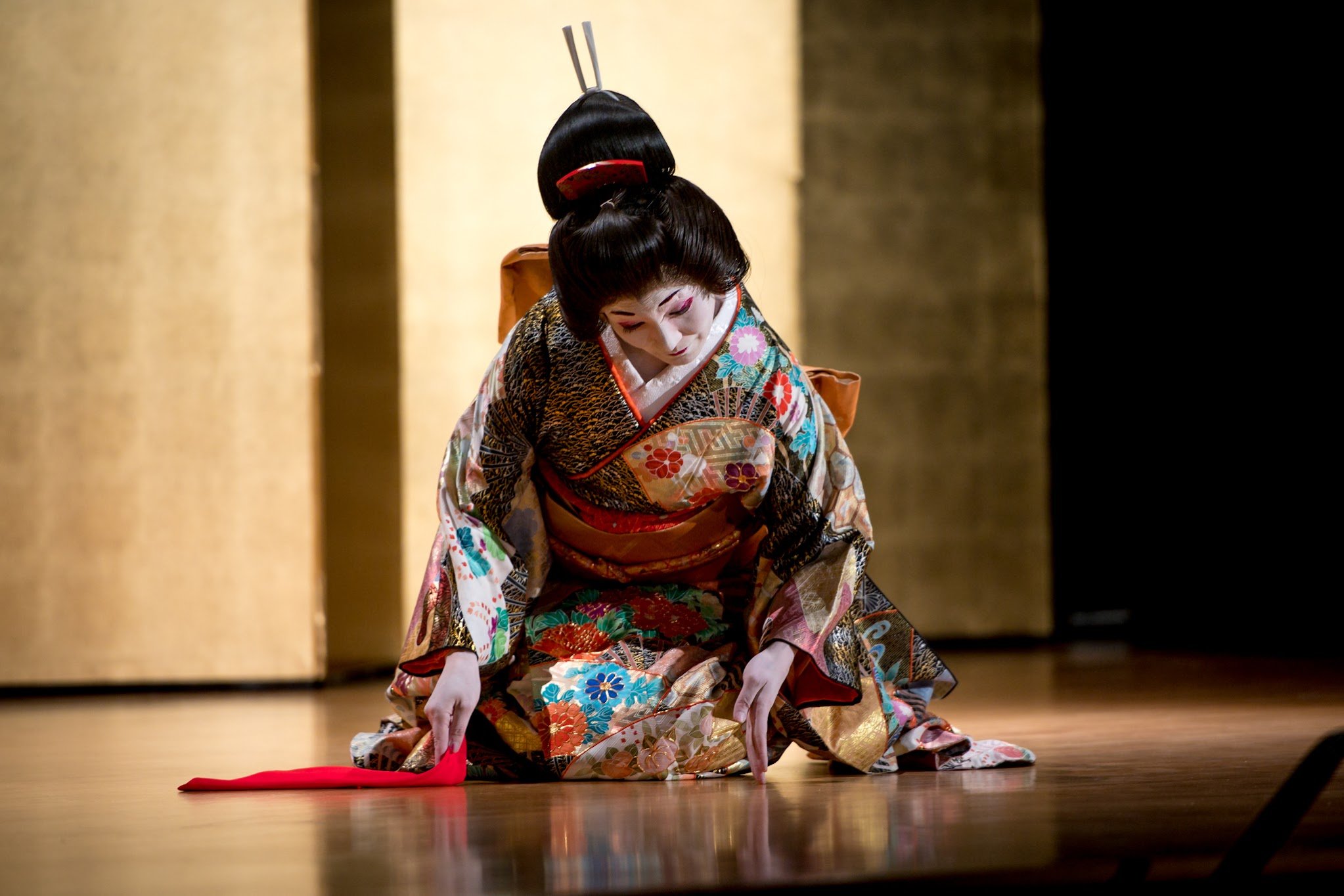
Foundations of Nihon Buyō: Classical Japanese Dance Workshop with HANAYAGI Toshikotono (Mamie Kakimoto)
Photo credit: Zemekiss
This participatory workshop will introduce Nihon Buyō traditional Japanese dance, a storytelling form of dance that grew out of narrative theatre. Hear about the history and aesthetics of this dance form and learn distinctive techniques such as hand and head movements, held poses (mie), walking mechanics, gender conventions, and prop handling (folding fans) that are used to define characters for the kabuki stage. Master instructor HANAYAGI Toshikotono (Mamie Kakimoto) will also demonstrate and perform sample pieces incorporating a range of these techniques.
No experience is necessary; this workshop is open to beginners as well as those with previous experience.
Date: Sunday July 21
Time: 11:00am - 12:30pm
Location: The Dance Centre - Marcuse Studio 7th floor
Session Price: $45
Become a newsletter subscriber and enjoy advanced access to register for programs and events.
About the Instructor:
HANAYAGI Toshikotono sensei began dancing at age two in Tokyo, Japan, under HANAYAGI Shizutoshi. She earned her professional name at age 16 and her teaching license when she was 26. She has performed at the National Theatre of Japan multiple times, as well as dancing overseas in Paris. She currently performs and teaches private lessons and small group classes in Vancouver, where her students perform at various community festivals under the name Tomoe Kai.
You can watch a video of Hanayagi Toshikotono dancing Kyōkanoko Musume Dōjōji below:
We gratefully acknowledge support from the Community Fund of the Japanese Canadian Legacies Society.

Immersive Tea Ceremony Experience of the Ichibōan Tea House and Roji Path at Nitobe Memorial Garden
Photos: Christina Cecconi
Immersive Tea Ceremony Experience of the Ichibōan Tea House and Roji Path at Nitobe Memorial Garden
Dates: Sundays on July 14th, August 11th, and September 8th, 2024
Session One: 11:00 am / Session Two: 1:30 pm
Length: 90 minutes each
Location: Nitobe Memorial Garden, UBC
Price: $48 - includes matcha tea service + admission to the garden
Join Maiko Behr, Founder and Executive Director of Dōjin Arts and tea instructor in the Omotesenke tradition, on a guided experience through the teahouse garden (roji) as guests would traditionally use the space -- slipping into "garden sandals" to navigate the stepping stones, sitting in the "waiting arbor," rinsing hands at the tsukubai stone basin, and entering the tea room through the nijiriguchi “crawling entrance.” As Maiko shares insights into the design and cultural significance of the tea garden and the tea house structure itself, feel yourself leaving the outside world behind as you proceed along the path and prepare to enter the tea room. Once inside, enjoy a matcha tea service with a special seasonal wagashi sweet.
Each 90-minute session will accommodate a maximum of 10 participants to ensure a high-quality, interactive learning experience.
Note: The sweet may contain sugar, rice, beans, wheat, eggs, or other potential allergens. We can advise you of all ingredients in advance, but regret that substitutions may not be possible.
About the Educator:
Maiko Behr has worked as a Japanese to English translator, curator, and consultant specializing in Japanese arts for over twenty years. She is the owner of SaBi Tea Arts, where she teaches chanoyu (Japanese tea ceremony) in the Omotesenke tradition and kōdō (Japanese incense ceremony) in the Senzan Goryū tradition. In the non-profit sector, Maiko has served locally on the board of directors of the Tomoe Arts Society for over ten years, and has worked and volunteered for various Japanese and Asian arts-related non-profit associations and museums in Canada and the US.
For advanced access to registration, be sure to subscribe to our newsletter.
Presented in partnership with UBC Botanical Garden and Nitobe Memorial Garden.
We gratefully acknowledge support from the Community Fund of the Japanese Canadian Legacies Society.

Crafting the Shakuhachi Bamboo Flute of Japan: Demonstration & Performance by Alcvin Ryūzen Ramos
Crafting the Shakuhachi Bamboo Flute of Japan: Demonstration & Performance by Alcvin Ryuzen Ramos. Join Dōjin Arts for an intimate evening getting to know all about shakuhachi 尺八. In this workshop, Alcvin will demonstrate each of the steps involved in craftinging a shakuhachi bamboo flute, sharing the various tools and techniques used. Guests will learn about the different kinds of shakuhachi and their various applications in music and meditation as well as experience the instrument played live by a local master in the tatami tearoom at SaBi Tea Arts.

Reflecting on Japanese Tea Ceremony in the Victorian era at the Roedde House Museum
Matcha in the Parlour at Roedde House Museum
Saturday May 25th
2 sessions: 1:00 pm & 3:00 pm
Maximum 10 guests per session
Tickets: $35 / $30 (seniors & students)
Step back in time with us as we host an intimate Japanese tea ceremony in the historic Roedde House parlour.
Although the practice of preparing tea for guests integrating Zen aesthetics and following carefully prescribed movements and protocols dates back more than 450 years, the forms are constantly evolving to suit the times. As traditional matcha tea is served at a modern-era tea table, longtime tea ceremony practitioner and instructor Maiko Behr will provide a general introduction to the Japanese tea ceremony with additional attention to the period of the encounter between East and West at the turn of the 20th century, contemporary with Roedde House. Join us for a glimpse at this interesting historical moment when traditional arts were adapting to the modern world.
Matcha (stone-milled green tea) and a traditional Japanese sweet* by Saki will be served.
Register and purchase tickets through Roedde House:
*Note: Sweets may contain beans, sugar, rice powder, and agar jelly. If you have dietary concerns, please contact us in advance. Due to the nature of the program, substitutions may not be possible.
About the Roedde House Museum:
Roedde House was built in 1893 for the family of Gustav Roedde and his family. The house was designed by architect Francis Rattenbury, and the family lived in the home from 1893 to 1920. The museum reflects the family's time in the house during the 1890s and early 1900s.
About the Educator:
Dōjin Arts Founder and Executive Director Maiko Behr has worked as a Japanese to English translator, curator, and consultant specializing in Japanese arts for over twenty years. She is the owner of SaBi Tea Arts, where she teaches chanoyu (Japanese tea ceremony) in the Omotesenke tradition and kōdō (Japanese incense ceremony) in the Senzan Goryū tradition. In the non-profit sector, Maiko has served locally on the board of directors of the Tomoe Arts Society for over ten years, and has worked and volunteered for various Japanese and Asian arts-related non-profit associations and museums in Canada and the US.
We gratefully acknowledge support from the Community Fund of the Japanese Canadian Legacies Society.

Immersive Tea Ceremony Experience of the Ichibōan Tea House and Roji Path at Nitobe Memorial Garden
Join Maiko Behr of The Dōjin Japanese Arts Society on this guided experience to gain insights into the design and cultural significance of the tea garden and the tea house structure itself before enjoying a matcha tea service with a special seasonal wagashi sweet by Saki.

Month of O-Hanami at The Nikkei Museum & Cultural Centre
Dōjin Arts is please to be presenting several programs as part of The Nikkei National Museum and Cultural Centre’s Month of O-Hanami Festival.
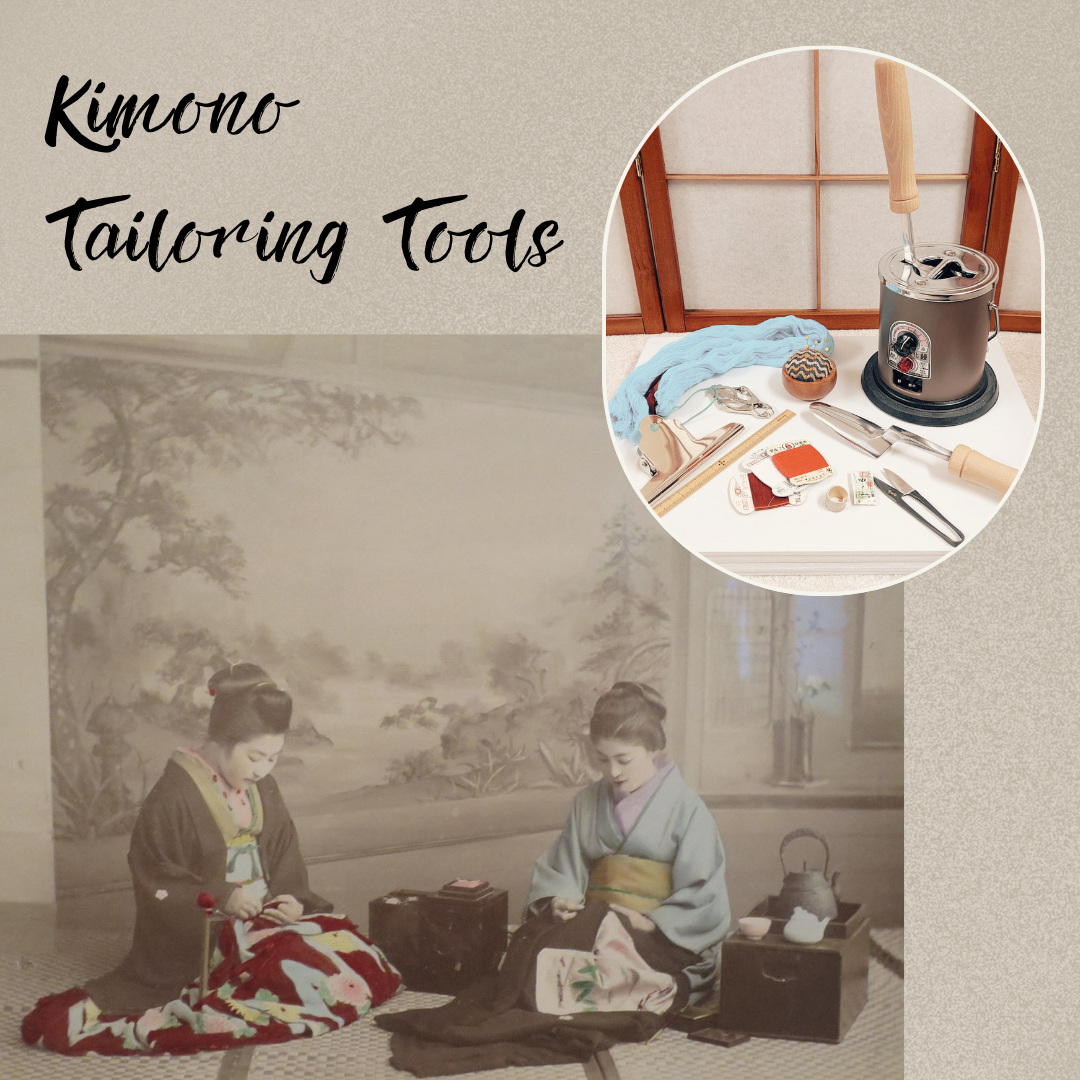
What is WA-SAI 和裁?: The Art of Kimono sewing series - April 21, May 26, June 23.
Join Evelyn Leung, professional costumer and certified Kimono Dressing Instructor in this 3-part lecture-demo series exploring what makes kimono sewing techniques distinctly different from those in the West.
Each lecture can be attended as a stand-alone session, or come to all 3 and begin your journey to making your own kimono!

Sakura Days Japan Fair
Dōjin Arts is pleased to be participating in this year’s Sakura Days Japan Fair April 13th & 14th at VanDusen Botanical Garden.

Nerikō (“Kneaded” Incense) Making Workshop 練香作り体験
We will be offering three time options for this 90-minute workshop:
Session 1 11:00am - 12:30pm
Session 2 1:30pm - 3:00pm
Session 3 4:00pm - 5:30pm
Learn about the art and history of Japanese blended incense before making your own batch of nerikō to enjoy at home.
Since the Heian period (794-1192), fragrant powdered ingredients were mixed with honey or plum flesh and kneaded into round pastilles know as nerikō. This form of incense is indirectly heated rather than burned to release aroma - ideal for smaller spaces and individuals sensitive to smoke.
During this 90-minute, hands-on workshop, guests will learn about the significance of nerikō and its use throughout Japanese history before getting their hands dirty blending and rolling their own incense to take home. All supplies and equipment will be provided. Participants will choose between Baika 梅花 (Plum Blossom) and Zuiun 瑞雲 (Auspicious Clouds), two specially formulated recipes crafted by the Senzan Goryū school of Kōdō (incense ceremony) in Kyoto, Japan.
Workshop $38 (materials included)

Festival Music and Dance of Old Tokyo with Eien Hunter-Ishikawa
Eien Hunter-Ishikawa
Join us for a lecture/demonstration on festival music — Edo Bayashi — and dance — Kotobuki Jishi celebratory lion dance — with Portland-based musician and educator Eien Hunter-Ishikawa.
The intimate salon-style setting of this program will offer the chance to experience the music and dance of the celebratory Shishimai lion dance up-close and to learn about the history and meaning behind this Intangible Cultural Asset of Folk Art from one of the rare experts in the field.
Eien is the founder of the Portland Shishimai Kai. He started learning Edo Kotobuki Jishi in 2001 under the instruction of Kenny Endo, continuing on to study with Kyosuke Suzuki, a longtime member of Wakayama Shachu (Nationally Designated Important Intangible Cultural Asset of Folk Arts). Eien is a certified instructor of all four parts - music and dance - of Wakayama Ryu Edo Kotobuki Jishi. Eien is also a gifted musician and composer on a variety of traditional Japanese instruments, especially taiko and shinobue flute.
Tickets: $45
To receive advance notice when tickets go on sale, sign up for our newsletter through the form below.

Traditional Japanese Winter Drinks: lecture-workshop series with Sen Sakamoto
Traditional Japanese Winter Drinks: lecture-workshop series with Sen Sakamoto

KADO - The Way of Wagashi - with Eijun Mitsubori
Eijun Mitsubori, previously known as Junichi, is an avant-garde artist celebrated worldwide for transforming the art of crafting wagashi into a captivating theatrical experience. His extraordinary "Way of Wagashi" performance has graced stages in Paris, New York, Hong Kong, Toronto, Sydney, Shanghai, and is now returning to Burnaby for the second time.
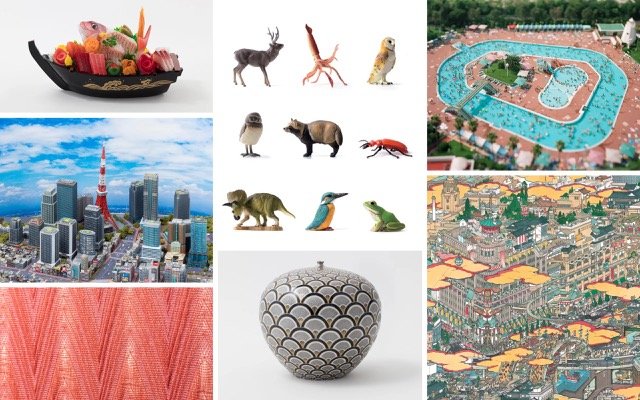
BLOOM: The Superlative Artistry of Japan - Preview Party
Join us on Saturday, November 4, from 1:00 to 4:00 pm, as we open the doors to a world of Japanese beauty. This event promises to be an afternoon of cultural immersion and sensory delight, at a time when Culture Day (bunka no hi 文化の日) is celebrated in Japan.

Autumn Afternoon of Tea & Flowers: Open House with the Sogetsu School of Ikebana and Dōjin Arts
image: "Chiyoda no ōoku: Chanoyu, mawaribana" (detail) by Toyohara Chikanobu (1838-1912), ōban triptych, 1895
Dōjin Arts is pleased to present an opportunity to enjoy an exhibition of ikebana arrangements by members of the Sogetsu Vancouver Branch (Sogetsu School of Ikebana) set in an authentic traditional Japanese tearoom.
Please join us for a bowl of matcha and traditional sweet as we celebrate these sister art forms that flourished under the influence of Zen Buddhist aesthetics and philosophy during the Higashiyama era (late 15th century). Members of Dōjin Arts and the Sogetsu School of Ikebana will be available to chat and answer any questions.
This will be a relaxed, open house setting, not a formal tea service. Donations in support of The Dōjin Japanese Arts Society are welcomed.
We look forward to collaborating with members of Sogetsu Vancouver to bring our communities together around the founding of The Dōjin Japanese Arts Society 同仁文化会.
